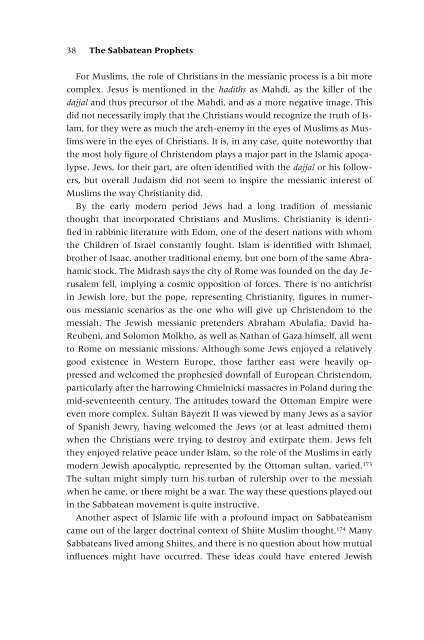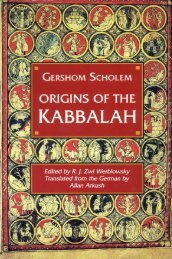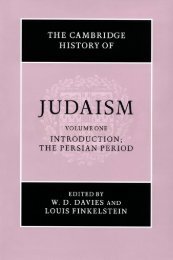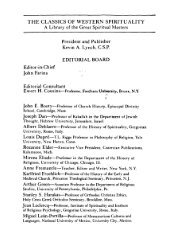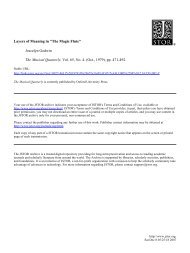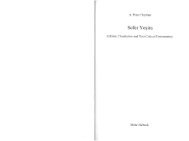You also want an ePaper? Increase the reach of your titles
YUMPU automatically turns print PDFs into web optimized ePapers that Google loves.
38 <strong>The</strong> <strong>Sabbatean</strong> <strong>Prophets</strong><br />
For Muslims, the role of Christians in the messianic process is a bit more<br />
complex. Jesus is mentioned in the hadiths as Mahdi, as the killer of the<br />
dajjal and thus precursor of the Mahdi, and as a more negative image. This<br />
did not necessarily imply that the Christians would recognize the truth of Islam,<br />
for they were as much the arch-enemy in the eyes of Muslims as Muslims<br />
were in the eyes of Christians. It is, in any case, quite noteworthy that<br />
the most holy figure of Christendom plays a major part in the Islamic apocalypse.<br />
Jews, for their part, are often identified with the dajjal or his followers,<br />
but overall Judaism did not seem to inspire the messianic interest of<br />
Muslims the way Christianity did.<br />
By the early modern period Jews had a long tradition of messianic<br />
thought that incorporated Christians and Muslims. Christianity is identified<br />
in rabbinic literature with Edom, one of the desert nations with whom<br />
the Children of Israel constantly fought. Islam is identified with Ishmael,<br />
brother of Isaac, another traditional enemy, but one born of the same Abrahamic<br />
stock. <strong>The</strong> Midrash says the city of Rome was founded on the day Jerusalem<br />
fell, implying a cosmic opposition of forces. <strong>The</strong>re is no antichrist<br />
in Jewish lore, but the pope, representing Christianity, figures in numerous<br />
messianic scenarios as the one who will give up Christendom to the<br />
messiah. <strong>The</strong> Jewish messianic pretenders Abraham Abulafia, David ha-<br />
Reubeni, and Solomon Molkho, as well as Nathan of Gaza himself, all went<br />
to Rome on messianic missions. Although some Jews enjoyed a relatively<br />
good existence in Western Europe, those farther east were heavily oppressed<br />
and welcomed the prophesied downfall of European Christendom,<br />
particularly after the harrowing Chmielnicki massacres in Poland during the<br />
mid-seventeenth century. <strong>The</strong> attitudes toward the Ottoman Empire were<br />
even more complex. Sultan Bayezit II was viewed by many Jews as a savior<br />
of Spanish Jewry, having welcomed the Jews (or at least admitted them)<br />
when the Christians were trying to destroy and extirpate them. Jews felt<br />
they enjoyed relative peace under Islam, so the role of the Muslims in early<br />
modern Jewish apocalyptic, represented by the Ottoman sultan, varied. 173<br />
<strong>The</strong> sultan might simply turn his turban of rulership over to the messiah<br />
when he came, or there might be a war. <strong>The</strong> way these questions played out<br />
in the <strong>Sabbatean</strong> movement is quite instructive.<br />
Another aspect of Islamic life with a profound impact on <strong>Sabbatean</strong>ism<br />
came out of the larger doctrinal context of Shiite Muslim thought. 174 Many<br />
<strong>Sabbatean</strong>s lived among Shiites, and there is no question about how mutual<br />
influences might have occurred. <strong>The</strong>se ideas could have entered Jewish


